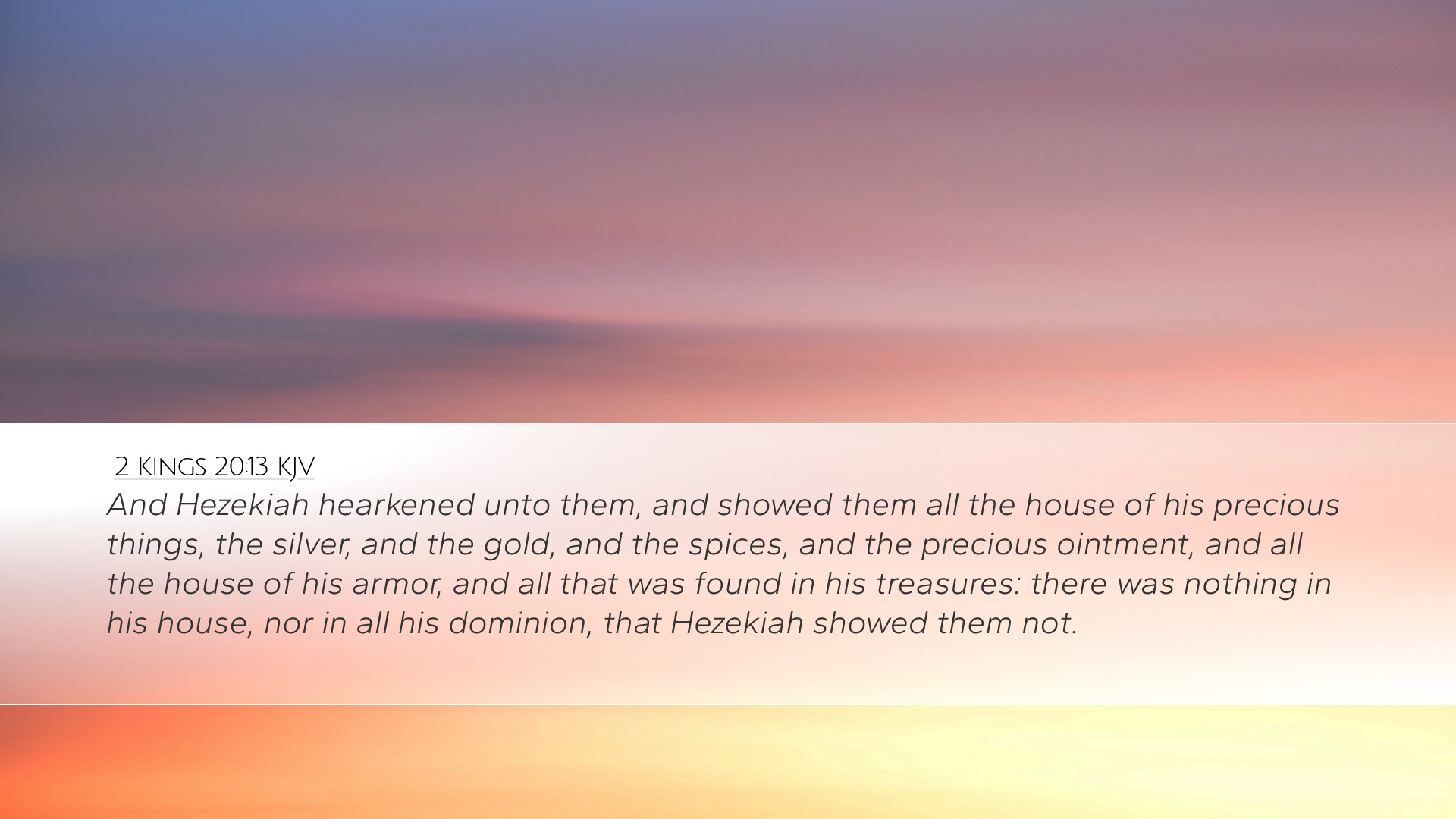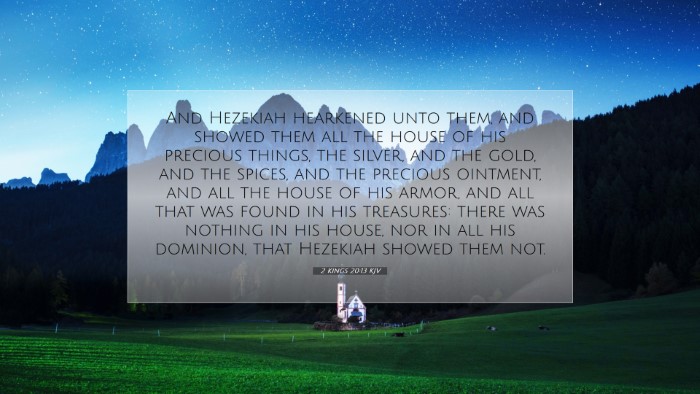Old Testament
Genesis Exodus Leviticus Numbers Deuteronomy Joshua Judges Ruth 1 Samuel 2 Samuel 1 Kings 2 Kings 1 Chronicles 2 Chronicles Ezra Nehemiah Esther Job Psalms Proverbs Ecclesiastes Song of Solomon Isaiah Jeremiah Lamentations Ezekiel Daniel Hosea Joel Amos Obadiah Jonah Micah Nahum Habakkuk Zephaniah Haggai Zechariah Malachi2 Kings 20:13
2 Kings 20:13 KJV
And Hezekiah hearkened unto them, and showed them all the house of his precious things, the silver, and the gold, and the spices, and the precious ointment, and all the house of his armor, and all that was found in his treasures: there was nothing in his house, nor in all his dominion, that Hezekiah showed them not.
2 Kings 20:13 Bible Commentary
Commentary on 2 Kings 20:13
2 Kings 20:13 states, "And Hezekiah hearkened unto them, and showed them all the house of his precious things, and the silver, and the gold, and the spices, and the precious ointment, and all the house of his armour, and all that was found in his treasures: there was nothing in his house, nor in all his dominion, that Hezekiah showed them not." This verse offers a glimpse into a significant moment in Hezekiah's reign and raises various theological and historical considerations.
Historical Context and Significance
This passage is set against the backdrop of Hezekiah, one of the kings of Judah, renowned for his faithfulness to God during a tumultuous period when the Assyrian Empire threatened Israel. Hezekiah’s piety and devotion to God are established throughout 2 Kings, especially during the chapters surrounding this verse. His actions in this passage reveal a mix of wisdom and folly.
Hezekiah's Diplomatic Encounter
The context of Hezekiah showing his treasures to the envoys from Babylon is crucial. According to Matthew Henry, this act demonstrated a level of pride and unwise openness towards foreign powers. In his attempt to impress the Babylonians, Hezekiah inadvertently displayed a lack of discernment, which ultimately placed Judah at risk.
The Nature of Hezekiah's Actions
- Pride vs. Humility: Adam Clarke emphasizes that Hezekiah's exhibition of wealth stemmed from a desire for recognition rather than a humble trust in the Lord. His earlier victory over Assyria might have led him to hold a higher opinion of himself.
- Implications of Showing Treasures: Albert Barnes notes that Hezekiah's demonstration of his riches could be interpreted as a sign of reliance on material wealth rather than on God. By showcasing everything, Hezekiah may have unintentionally invited future conflict.
Theological Reflections
This verse and its implications can lead to significant theological insights regarding reliance on God versus earthly riches. The Bible consistently warns against placing trust in material possessions.
Trust in God Over Wealth
As Matthew Henry comments, "The world is full of snares, and those who seek occasion to exalt themselves may find themselves ensnared by their own pride." Hezekiah's actions caution against a reliance on one's resources, emphasizing that true security lies in God’s provision and protection.
Lessons for Contemporary Faith
- Spiritual Vigilance: The believers today are called to be attentive to how they present themselves and their resources. Like Hezekiah, they must not become prideful in their achievements.
- Discernment in Relationships: The wisdom in choosing which relationships to cultivate is vital. Hezekiah's encounter teaches that not every foreign alliance will benefit one's spiritual health.
Reflection on Leadership
Hezekiah's leadership is a mixed example. He achieved much good yet failed in this moment of vulnerability. According to Albert Barnes, "Hezekiah's act is a practical demonstration of the wisdom needed in leadership," highlighting that leaders must exhibit both humility and discernment.
Implications for Pastors and Leaders
For pastors and church leaders, this passage reflects the need for integrity and humility in leadership. Just as Hezekiah faced scrutiny from God, so too are leaders called to uphold a standard that glorifies God above their personal achievements.
Principles of Godly Leadership
- Transparency with Accountability: Leaders should be transparent but also cautious, recognizing that their decisions can affect the entire congregation.
- Seeking Godly Counsel: It is crucial for leaders to seek God’s wisdom first rather than relying solely on visible success or reputation.
Conclusion
2 Kings 20:13 provides rich material for reflection and application. Hezekiah’s actions serve both as a cautionary tale and an opportunity for deep theological introspection. This passage reminds us of the importance of humility, trust in God, and the weight of leadership responsibilities. As both ancient and contemporary followers of God, our pursuit should always be in reliance on divine strength rather than worldly success.


